
Neuilly-Auteuil-Passy, sometimes also referred to just as Passy-Auteuil, refers to an area covering the westernmost part of the city of Paris and a neighbouring suburban community. This area is commonly known as one of the richest in Paris, with calm, select and very expensive neighbourhoods.
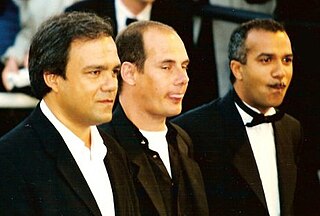
Les Inconnus are a French trio of humourists consisting of Didier Bourdon, Bernard Campan and Pascal Légitimus. While their first successes were on stage, they are most famous for their satirical sketch comedy television show La Télé des Inconnus, which premiered in 1990 and remained popular throughout the early 1990s. Following their television success, the group went on to produce music and movies, most of them written and directed by Bourdon and Campan. After the movie Les Trois Frères in 1995, the trio encountered contract problems with their manager Paul Lederman, which caused the group to split up, though they reformed in the early 2000s. There have been several films released since then that have featured at least two former members together.

"White and Black Blues" was the French entry in the Eurovision Song Contest 1990, performed in French by Joëlle Ursull, from her album Black French. The song was performed fourteenth on the night of the competition. At the close of voting, it had received 132 points, tying for second place in a field of 22. "White and Black Blues" was co-written by French pop provocateur Serge Gainsbourg, who had previously composed France Gall's winning entry for Luxembourg in 1965, "Poupée de cire, poupée de son", as well as the Monegasque entry "Boum-Badaboum" for Minouche Barelli in 1967, which had finished fifth.
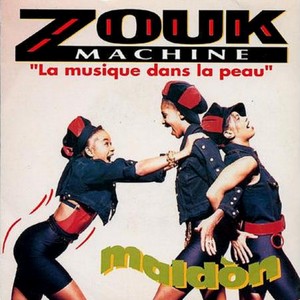
"Maldòn" is a 1989 song recorded by the Guadelupian band Zouk Machine. Written and produced by Guy Houllier and Yves Honoré, the song is the first single from the album of the same name, and was released in May 1990. In France, it achieved a huge success, topping the singles charts for nine weeks.
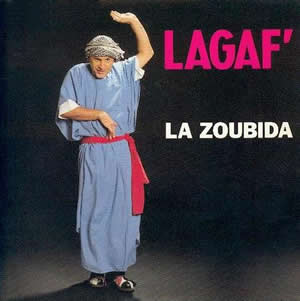
"La Zoubida" is a 1991 novelty song recorded by the French TV presenter and humorist Vincent Lagaf'. In May 1991, it was the second single from his album Le Lavabo. It became the summer hit of 1991, staying at the top of the French Singles Chart for three months. The song formed the basis for a side-scrolling platform game, Lagaf': Les Aventures de Moktar — Vol 1: La Zoubida, developed by Titus Interactive; the game would later be altered and released as Titus the Fox internationally.

"Easy Lady" is a song by Italian singer Spagna, released in 1986 as the lead single from her debut studio album, Dedicated to the Moon (1987).
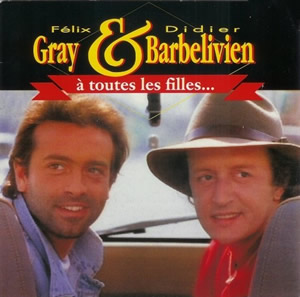
"À toutes les filles..." is a 1990 song recorded as a duet by the French singers Didier Barbelivien and Félix Gray. This ballad was released in May 1990 as the first single from their album Les Amours cassées. It achieved a huge success in France, topping the chart and becoming a very popular song throughout years.
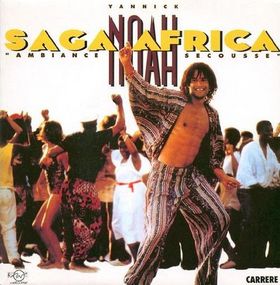
"Saga Africa" is a song recorded by the former professional tennis player Yannick Noah, released in 1991 as the first single from his debut album, Black & What. The song is also available on the singer's album entitled Live, released in 2002.

"Nuit de folie" is a 1988 popular song recorded by French pop duet Début de Soirée. It was their debut single from their album Jardins d'enfants and was released in June 1988. In France, it became the summer hit of the year, topping the chart for over two months. It was re-released in 2000 in a remixed version, but it did not reach success.

"High" is a 1988 song recorded by French artist David Hallyday. It was the second of the four singles from his debut studio album True Cool. Released in November 1988, the song was a hit in France, becoming David Hallyday's first number-one single.

"Qui a le droit..." is a pop song recorded by French artist Patrick Bruel. Written and composed by Gérard Presgurvic and Patrick Bruel, it was the first single from his album Si ce soir..., recorded after his first concerts tour. It was released in a live version in late October 1991 under RCA label and was a hit in France, becoming Bruel's only number-one single.
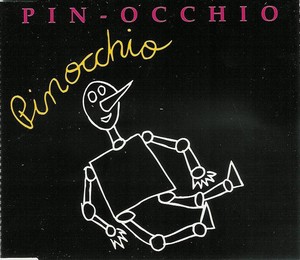
"Pinocchio" is a 1972 instrumental composed by Fiorenzo Carpi for the soundtrack of Luigi Comencini's miniseries The Adventures of Pinocchio. In 1993, it was successfully covered by Eurodance music group Pin-Occhio which make it a number one hit in Belgium, and a top ten hit in Italy, France and the Netherlands. At the same time, it was also covered by Pepeto which was a top ten hit in Spain. In 2005, a massive hit was recorded by Pinocchio, an animated character, under the title "T'es pas cap Pinocchio".
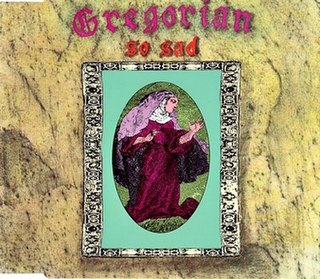
"So Sad" is the debut single recorded by German band Gregorian. It was written and produced by Frank Peterson, and is from the album Sadisfaction (1991), on which it appears as the third track. The song is composed of Gregorian chants using biblical verses while in the chorus a woman is asking Jesus Christ why she is so sad. In the music video, she first enters a church, then becomes a nun. The song was included on Gregorian's best of compilation titled Best of 1990–2010, released in 2011, on which it appears as the first track. It became a hit in France and Portugal.

"Il faut laisser le temps au temps" is a 1990 song recorded as a duet by the French singers Didier Barbelivien and Félix Gray. Written by Barbelivien, while the music was composed by Gray, this ballad was released in November 1990 and became the second single from their 1991 album Les Amours cassées. It hit number one on the single chart in France, and was also a success in the French-speaking part of Belgium.

"J'ai peur" is a 1989 song recorded as a duet by French and American singers François Feldman and Joniece Jamison. Written by Jean-Marie Moreau with a music by Feldman, this dance-pop song was released in February 1991 and became the fifth single from Feldman's 1989 Diamond-awarded album Une Présence. As the previous singles from the album, it was a successful top ten hit, though it was the less-selling one.
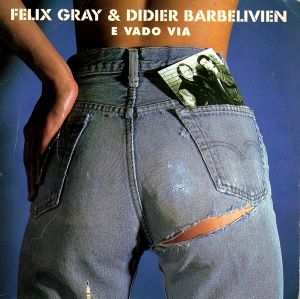
"E vado via" is a 1991 song recorded as a duet by French singers Didier Barbelivien and Félix Gray. Written by Barbelivien with a music composed by Gray, this ballad was released in November 1990 and became the third single from their 1991 album Les Amours cassées, on which it is the opening track. Lyrics are in French, except for the chorus which is sung in Italian by a female voice. It was a hit in France, peaking at number five, though it did not reach the same success as the duo's previous two singles.

"Danca tago-mago" is a 1991 song recorded by French-Brazilian band Kaoma. Written by Loalwa Braz with amusic by Michel Abihssir, it was released in the summer of 1991 as the first single from their second album Tribal-Pursuit, on which it appears as the first track. It was a hit in Europe, reaching the top ten in France, Belgium, Portugal and the Netherlands, and became Kaom's last hit worldwide.

"Dis-moi bébé" is a 1990 song recorded by Belgian hip hop act Benny B, with DJ Daddy K also credited on the single's cover. Written by Amid Gharbaoui with a music composed by Vito Lucente, Alain Deproost and Richard Quyssensand, "Dis-moi bébé" is a rap-ballad song with a love theme, unlike the previous singles from the album. Released in June 1991, it was the third and last single from Benny B's first album, L'Album. As for the previous two singles, it became a hit in France and in Belgium (Wallonia) where it reached the top five.

"Déjeuner en paix" is a 1991 pop rock song recorded by Swiss singer Stephan Eicher. Written by Philippe Djian and composed by Eicher, it was released in the middle of 1991 as the lead single from his sixth studio album Engelberg, on which it appears as the fourth track. It became a hit in France and Belgium (Wallonia) and became Eicher's most successful single on the charts.

"Darlin'" is a 1990 soft rock and pop song recorded by Canadian singer Roch Voisine. It was released in January 1991 as the second single from his second studio album Double, on which it appears as the sixth track. It became a top five hit in France and Belgium (Wallonia); in addition, it was nominated for the Félix Award given in Quebec by the ADISQ in the category "Popular song of the year".




















